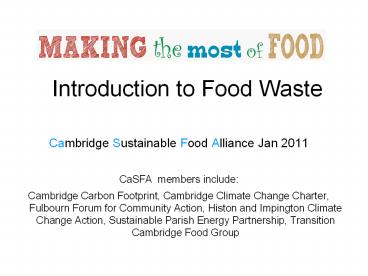Introduction to Food Waste PowerPoint PPT Presentation
Title: Introduction to Food Waste
1
Introduction to Food Waste
- Cambridge Sustainable Food Alliance Jan 2011
- CaSFA members include
- Cambridge Carbon Footprint, Cambridge Climate
Change Charter, Fulbourn Forum for Community
Action, Histon and Impington Climate Change
Action, Sustainable Parish Energy Partnership,
Transition Cambridge Food Group
2
This presentation is about
- Food waste facts
- Sustainability issues
- Tips to reduce waste
3
Quantity of Food Waste in the UK
- Between ¼ and ½ of all food destined for home
consumption is wasted - 8.3 million tonnes wasted from households
- 4.3 million tonnes of packaging
- 3.0 million tonnes wasted manufacturing foods for
household use.
4
Types of food we throw away
- Unavoidable 1.5 million tonnes
- E.g. Bones, egg shells, teabags
- Possibly Avoidable 1.5 million tonnes
- Eg potato peelings, bread crusts
- Avoidable 5.3 million tonnes
- 50 cooked too much or served too much
- 40 gone off
- 10 unknown
5
Money thrown away
- For the average household of 2.4 people that is
480/year - Children raise the cost to 680/year
- Up to 50/month could be saved with a bit of
planning
6
Who wastes what?
- Every age group wastes food
- Mainly fruit and vegetables are wasted but all
food groups are wasted.
7
Sustainability issues What are we wasting?
- The grain used to make flour is rich in energy
and minerals. - Minerals are harvested from the ground by the
parent plant, energy is converted from sunlight.
8
Minerals, water and energy
- Minerals taken away in the harvest must be
replaced or the soil will not produce more food. - Rock deposits of some important minerals such as
phosphorus, are being rapidly used up. Recycling
minerals is more sustainable. - Plants need water and water is scarce in many
regions such as the south of Spain or Egypt.
Water is too valuable to waste. - Growing and harvesting our crops uses energy
for planting, weeding, fertilising, harvesting.
This can be from human labour or from fossil
fuels (through chemical inputs and tractors).
This is embedded energy.
9
The people producing our food
- The UK has not been self sufficient in food for
centuries - Think about who produced your food
- What sort of returns do they get for their work?
- Who owns the land? Who gets the profits?
- Is enough land allocated for food for the local
people? - Are the workers protected from chemical sprays?
- Is the local ecology damaged by fertiliser
runoff? - Imported food is often grown under less strict
regulation than we expect here in the UK. This
affects the environment, domestic animals and
people.
10
Sustainable food
- Growing food sustainably means
- minimising use of fossil fuel energy
- returning nutrients to the soil
- looking after the people who produce our food.
- Food is too valuable to waste
- Make the Most of Food
11
What should we be eating?
- Eating too much of the wrong things is waste
- We need a balanced diet
- but this doesn't mean we have to eat the same
thing every day. We average our nutrient intakes
over days and weeks. - The Eatwell plate shows the proportions of the
main food groups we need
12
(No Transcript)
13
Food Hygiene
- Food will go off more quickly if not stored
correctly - Bugs can cause infection or produce toxins (not
destroyed by cooking) - High risk foods are meat, fish and cooked rice.
14
Tips on food safety
- Pay attention to use-by dates and know what is
in your fridge/freezer - Check the temperature of your fridge and freezer
- You can refreeze food if it has been cooked
since it came out of the freezer - Food safety bingo www.food.gov.uk/northernirelan
d/safetyhygieneni/bingo (http//goo.gl/HhGCG for
short)
15
Food storage tips
- Keep potatoes in a cool, very dark place
- Store fruit in the fridge
- Just put out a few pieces in the fruit bowl
- Keep cucumber cut end down in a mug
- Lots more tips at http//www.lovefoodhatewaste.co
m/
16
Estimating portions
- Cooking and serving too much are the biggest
causes of waste - Measure or estimate portions (you know your
families appetite) - http//www.lovefoodhatewaste.com/perfect_portions
- Use scales for potatoes
- Use a cup to measure out rice
- use a plate while preparing vegetables to
estimate servings
17
Serving
- Serve small portions or allow people to serve
themselves. Let them come back for seconds or
thirds. - Food that has not been put onto plates can be
stored for reuse. - Use leftovers for breakfast, lunch, or as part of
another main meal - soup, stir-fry, curry, risotto, buffet ...
18
Meal Planning
- Either Forward planning
- Plan your meals and shop only for the items on
your menu. - www.lovefoodhatewaste.com/documents/Blank_planner.
pdf - Or Seasonal purchasing
- Buy seasonal vegetables for 3-4 days
- Plan meals around what is in your basket
- Or a combination of the two.
19
Shopping
- Minimise trips to the supermarket so you are less
tempted by their marketing snares. - Home milk deliveries by the milkman
- Small local retailers for bread, fruit,
vegetables, eggs and meat - Grow your own vegetables, fruit and eggs
20
- Plan your meals,
- Buy what you need
- Prepare and cook what you need
- Serve what each person needs
- Reuse leftovers where safe
- If you need to dispose of waste work out the best
method of disposal, return your nutrients to the
local environment - Home composting
- Green bins

